Increasing Risk of Double Dip Recession as Leading Economic Indicators Start to Turn
Economics / Double Dip Recession Jun 26, 2010 - 07:06 AM GMTBy: John_Mauldin
 The Risk of Recession
The Risk of Recession
The Leading Indicators Are Starting to Turn
Terms of Trade and US Real GDP
Bernanke at the Crossroads
We are halfway through the year (where did the time go?) and it is time to make some predictions about the last half of the year. This week we look at what the leading indicators are telling us, size up a new indicator, drop in on banking data, and do a whole lot more.
Quickly, I will be on Larry Kudlow's show next Tuesday, which is at 7 pm Eastern. Larry has promised that we will spend some quality time on some of the current issues facing us. See you there! And now, let's jump in.
The Risk of Recession
I am on record as saying I think there is a 50-50 chance we slip back into recession in 2011, as I think the economy will soften in the latter half of the year and a large tax increase in 2011 (from the expiring Bush tax cuts) will tip us into recession.
This was not based on data, but rather on research which shows that tax cuts or tax increases have as much as a 3-times multiplier effect on the economy. If you cut taxes by 1% of GDP then you get as much as a 3% boost in the economy. The reverse is true for tax increases. Christina Romer, Obama's head of the Council of Economic Advisors, did the research along with her husband, so this is not a Republican conclusion.
If the economy is growing at less than 2% by the end of the year, then a tax increase of more than 1% of GDP could and probably would be the tipping point. Add in an almost equal amount of state and local tax increases (and spending cuts) and you have the recipe for a full-blown recession - at least the way I see it.
I was asked at my recent speech in Milan, what sorts of things could make me wrong? There are a few. First, it could be that tax increases and cuts don't matter. Some very smart people (like Paul McCulley) feel that tax increases on the wealthy don't really figure into Romer's analysis.
Or maybe bank lending starts to pick up and the economy is actually growing at 3-4% by the end of the year - although the chart below suggests that bank lending is still in freefall. Notice that if this trend continues just a little while longer, bank lending will have fallen by 25% in about two years. This is a truly scary chart. It is unprecedented in modern history. Also notice that after the 2001 recession bank lending continued to fall for over two and a half years.
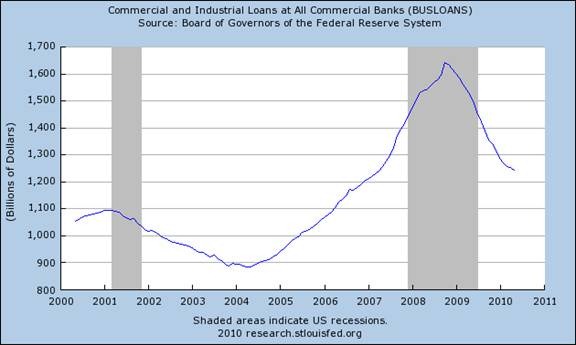
Or perhaps Congress decides to extend the Bush tax cuts or phases in the increase over time. That would be better and maybe not push us into recession. Maybe they vote for more stimulus, although that does not look likely. If Congress cannot extend unemployment benefits, as happened this week, then other stimulus is unlikely.
The uber-Keynesians that are in control of our economic policy clearly do not think that large tax increases matter, or if they do think so they are not speaking out about them. They are conducting an experiment on our economic body without benefit of anesthesia. Here's a prediction about which I can feel confident: if we do slip back into recession, they will blame some factor other than the tax increase and call for massive stimulus. In fact, they will probably say that the lack of stimulus was the problem in the first place. Paul Krugman will be the head cheerleader.
(For a quick, fun, and instructive read, go to Joshua Brown's web site [The Reformed Broker] and read about the Econ Gangs of New York, where Joshua describes the various groupings of economic thinkers. Seems I am in the gang led by my friend Mohamed El-Erian, the New Normalers. Krugman, of course, is the leader of the New Jack Keynesians, a most vicious and pernicious gang, in my opinion. http://www.thereformedbroker.com/2010/06/24/econ-gangs-of-new-york/)
Going into the last two recessions we had an inverted yield curve (where short-term rates are higher than long-term rates), which made it easy to predict a recession. Let's look at a graph of the yield curve from my e-letter of February 16, 2007. Notice that the 3-month T-bill is about 45 basis points higher then the 10-year bond, which is what the studies use as the basis for their analysis. The curve had been like this since before September of 2006, when I was predicting a recession about a year out. (An inverted yield curve is the best predictor we have of a recession one year out that. A yield curve like the one below has always been followed about one year later by a recession.)
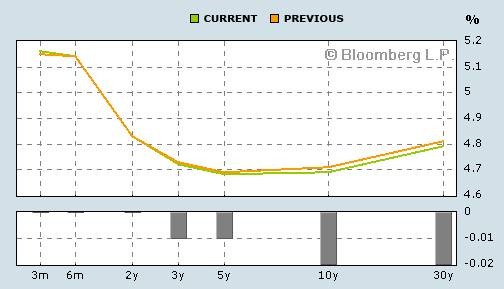
Here is today's yield curve. It is normal (if you can call anything in a 0% Fed rate environment normal), and while not as steep as it used to be, is still quite steep. (Bloomberg)
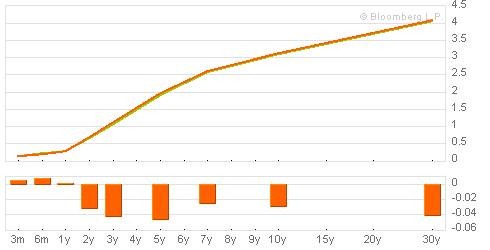
We are not going to get an inverted yield curve when the Fed is holding rates at 0%. The curve we have today is not signaling a recession. It suggests that those who see continued recovery are right.
I am not so sanguine. I was on a panel with Martin Barnes (of Bank Credit Analyst, and one of the best economic minds I know) at David Kotok's shindig in Paris last week. Martin and I are very good friends, but we do tend to go at one another. It makes for a very interesting panel for the audience.
I posited that I think the chances are better than even that we have a recession in 2011. Martin said (insert deep Scottish brogue), "John, double-dip recessions are very rare." And he's right. The last (and only) one we had was because Volker was stamping on the brakes trying to bring inflation under control in the '80s.
My rejoinder was along these lines: We are not coming out of a normal business-cycle recession. We went through a debt crisis and a balance-sheet, deleveraging recession. The old data that we used to judge recoveries by just does not apply here. At best, it is misleading.
It wasn't just a bubble in housing, it was a bubble in debt. And now we are reducing that debt. We are coming to the end of the Debt Supercycle (a term coined long ago by ... Bank Credit Analyst). We now have a bubble in government debt that is getting ready to burst in one country after another. What is indeed a very rare thing (a double-dip recession) is a very real possibility. Since we don't have the yield curve to guide us, let's look at what we do have.
The Leading Indicators Are Starting to Turn
Even while I was on vacation in Italy, I had to regularly feed my addiction for economic and investment information. Over the course of a few days I ran across several studies on the Economic Cycle Research Institute's (ECRI) Index of Weekly Leading Economic Indicators. The index has turned down of late. Chad Starliper of Rather & Kittrell sent me the following charts and analysis. (I love it when someone else does the work for me while I'm on vacation!)
"The ECRI has been getting some news of late. I did a little work on it, played with the rates of change, and found something a little ominous you might be interested in. The normal reported growth rate is an annualized rate of a smoothed WLI. However, when the 13-week annualized rate of change is used - shorter-term momentum - the decline in growth has fallen to a very weak -23.46%. The other times it has fallen this fast? All were either in recession or pointing to recession in short order (Dec. 2000)."
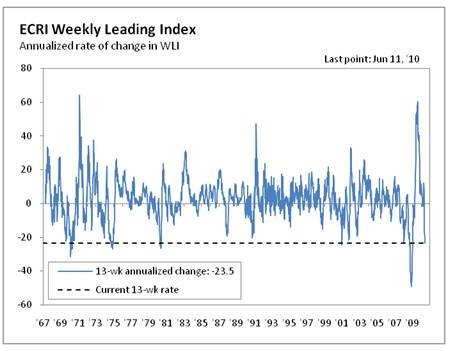
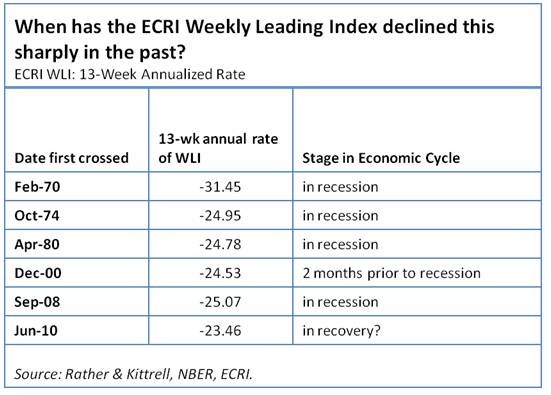
Jonathan Tepper (coauthor of the next book I am working on) sent me this piece from a group called EMphase Finance, based in Montreal. They wrote this back in April, as the Weekly LEI was beginning to turn over. They have found a bit of data that seems very good at predicting the economy of the US 12 months out. Let's take part of their work:
Terms of Trade and US Real GDP
"Many market participants are debating whether or not a double-dip recession will occur within the next quarters. As we are writing our report, ECRI Weekly LEI fell quickly to 122.5 points from 134.7 in April. This indicator did a good job leading U.S. Real GDP Y/Y by 6 months over the last two decades. However, ECRI Weekly LEI recently became quite unreliable as it increased up to 25% Y/Y in April, a level consistent with an unrealistic 8% U.S. Real GDP Y/Y! You can notice the problem on the left chart below.
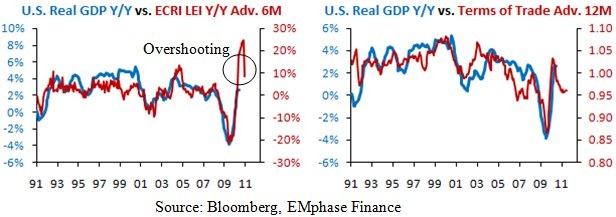
"We discovered a new leading indicator to forecast U.S. Real GDP Y/Y, and it is simply the U.S. Terms of Trade (TOT). It is defined as the export price / import price ratio. We are pleased to be the first to document this, at least publicly. On the right chart above, TOT leads U.S. Real GDP Y/Y by 12 months. The only drawback: underlying time series are monthly instead of weekly, but this is not really an issue with that much lead. Also, the relationship still holds well if we extend to the maximum data (1985)."
Their conclusion?
"As you probably noticed earlier, TOT is suggesting a decline of U.S. Real GDP Y/Y to nearly 0% within the next 12 months. Q2 2010 Real GDP Q/Q Annualized to be released on the 30th July may match expectations as it reflects data of the last three months, which were positive in general. However, we are most likely going to see weaker numbers in the next quarters. Will this lead to a double-dip recession? We believe the odds of a double-dip recession within the next 9-12 months are minimal, but odds may increase to 50-50 in 2011, depending on the evolution of variables we follow in the upcoming months."
And while we are on leading indicators, let's end with this note from good friend and data maven David Rosenberg of Gluskin Sheff (based in Toronto).
"For the week ending June 11th, the ECRI leading index (growth rate) slipped for the sixth week in a row, to -5.7% from -3.7%. Only once in the past - in 1987, but the Fed could cut rates then - did this fail to signal a recession. But a -5.7% print accurately signaled a recession in the lead-up to all of the past seven downturns.
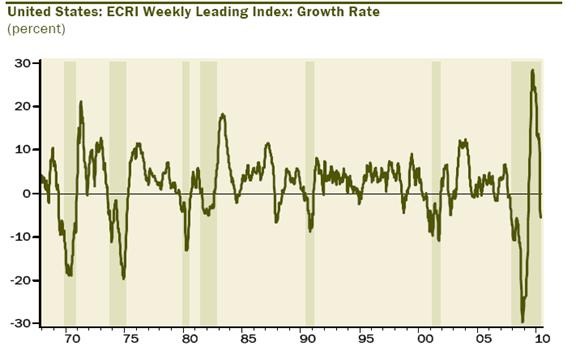
"The consensus is looking at 3% real GDP growth for the second half of the year, but as Chart 2 suggests, the two quarters following a move in the ECRI to a -5% to -10% range is +0.8% at an annual rate on average. So right now the choice is really either a 2002-style growth relapse or an outright double-dip recession - pick your poison."
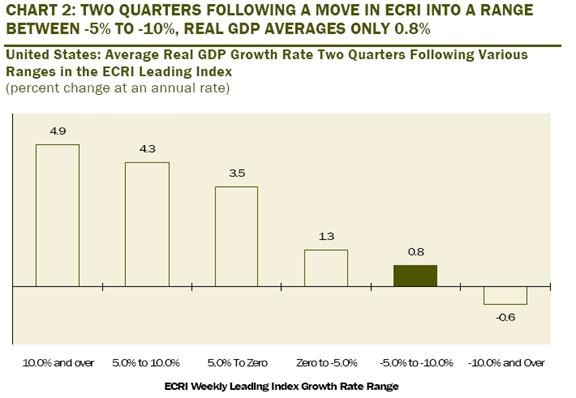
My take is that Bush cut taxes in 2001 and again in 2003 in the face of weak economic circumstances. Unless something changes, we are going to enact the largest tax increase in US history. And that will be matched by equally large tax increases and spending cuts by state and local jurisdictions. And we are going to do it at a time when the above research suggests that growth may be in the 1% range and unemployment will still be in the 9-10% range. Extended unemployment benefits will be long gone for many people. Housing will still be in the doldrums (more on that in next week's Outside the Box) and housing prices are likely to fall from here.
Growth in the first quarter was revised down (again!) to 2.7%, or about half that of the 4th quarter of last year. Much of what passed for growth was inventory rebuilding and stimulus. The underlying economy may be weaker than the headline number reveals. And by the 4th quarter, there is very little stimulus.
Given the above, I think we have to increase the odds of a 2011 recession to 60%, and those odds will rise and fall based on the economic performance of the next two quarters.
Do tax increases matter? We are about to find out.
And if I am wrong, I will be spectacularly wrong. And I hope I am. But you have to call it as you see it.
Bernanke at the Crossroads
I went to the crossroads, fell down on my knees I went to the crossroads, fell down on my knees Asked the Lord above, have mercy now - Robert Johnson
If I am right about the potential for a recession, it is going to bring Ben Bernanke and the Fed to a very serious crossroads. Recessions are by definition deflationary. But inflation is already as low as it has been in a very long time. Core CPI is less than 1%. The Dallas Fed's Trimmed Mean Inflation Index is down to 0.6% for the last 6 months.
If we enter into a recession, it is quite possible that the US could go into outright deflation. That is what M3 is saying. Take a look at this chart from John Williams of Shadowstats, who still tracks M3. But all the measures of money-supply growth are turning down. This is signaling deflation. ( http://www.shadowstats.com/)
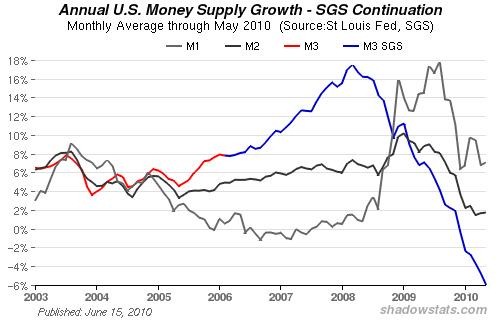
Albert Edwards of SocGen noted this week, "We are now walking on the deflationary quicksand." Treasury markets seem to be pointing to a deflationary outcome. In the next recession, we could all become Japanese, unless ...
You have to understand that when you become a Fed governor you are taken into a back room and given a DNA change. Henceforth, you become viscerally and genetically opposed to deflation. (Well, except for Tom Hoenig, president of the Kansas City Fed. His DNA change did not take. He wants to raise rates now, and is the lone dissenter at the Fed meetings. On a side note, when you Google Tom Hoenig, you get six pictures of him. Five are clearly of him, and one is moldy bread. I am not sure what that means. By the way, Tom, my invitation to Jackson Hole got lost again this year! And I would be happier with Hoenig as Secretary of the Treasury, for what that's worth.)
What's a central banker to do? Bernanke gave us the road map back in 2002 in his famous helicopter speech. As a last resort, you print money. But the Fed already has a very pregnant balance sheet. Can they push another $2 trillion into the economy to combat deflation? Will they?
Deflation is the antidote to debt, and especially those who are over-indebted. Great Britain seems to be purposefully pursuing a little inflation to make its debt burden easier. Will the US do the same?
If we slip into recession and deflation, I expect the Fed to react with more quantitative easing. They will start to take down longer-dated paper as they move out the yield curve. Could they expand the Fed balance sheet? Oh yes. We are in uncharted territory, gentle reader.
Vancouver, Maine, and San Francisco
I will be at the Agora Conference in Vancouver July 20-23. There will be a lot of good friends and great speakers. It will be a great time. You should consider joining me. http://agorafinancial.com/reports/vancouver/2010/vancouver2010_2.php?pub=C2010AFVAN&code=E400L5NC
Then, after my regular fishing trip to Maine, I will be in San Francisco for The Money Show, August 19-21 at the Marriott Marquis. You'll have the opportunity to meet with 50+ leading experts, who will cover everything from the global economy and markets to biotech, greentech, nanotech, and much more. Register for free by calling 800/970-4355 and mentioning priority code 018914, or register online at The MoneyShow San Francisco!
I fell in love with Tuscany. I will go back. We stayed at a wonderful villa in Trequanda (near Chuisi) which is a small village in the heart of Tuscany, with wonderful restaurants and a magnificent view, and not too far from all the cool places. We were the first family to stay at the newly refurbished villa, and the owners had done it up right. I think there are about 6 bedrooms, although some of the suites can be rented separately. The cost was quite reasonable. You can see it at www.ifiordalisi.com. Marcia Hadley set us up with cooks, guides, and so much else. They are wonderful hosts - I highly recommend them.
Finally, I attach two pictures of the Mauldin horde. One in Rome and the other in Trequanda, where you can look over our shoulders at the view. The kids all make a point each vacation of taking a goofy picture. I look goofy naturally so did not have to do anything special.
Have a great week. And remember, we Muddle Through. The world does not come to an end. It's just a recession.


Your now getting ready to crash out this book analyst,
By John Mauldin
John Mauldin, Best-Selling author and recognized financial expert, is also editor of the free Thoughts From the Frontline that goes to over 1 million readers each week. For more information on John or his FREE weekly economic letter go to: http://www.frontlinethoughts.com/learnmore
To subscribe to John Mauldin's E-Letter please click here:http://www.frontlinethoughts.com/subscribe.asp
Copyright 2010 John Mauldin. All Rights Reserved
John Mauldin is president of Millennium Wave Advisors, LLC, a registered investment advisor. All material presented herein is believed to be reliable but we cannot attest to its accuracy. Investment recommendations may change and readers are urged to check with their investment counselors before making any investment decisions. Opinions expressed in these reports may change without prior notice. John Mauldin and/or the staff at Millennium Wave Advisors, LLC may or may not have investments in any funds cited above. Mauldin can be reached at 800-829-7273.
Disclaimer PAST RESULTS ARE NOT INDICATIVE OF FUTURE RESULTS. THERE IS RISK OF LOSS AS WELL AS THE OPPORTUNITY FOR GAIN WHEN INVESTING IN MANAGED FUNDS. WHEN CONSIDERING ALTERNATIVE INVESTMENTS, INCLUDING HEDGE FUNDS, YOU SHOULD CONSIDER VARIOUS RISKS INCLUDING THE FACT THAT SOME PRODUCTS: OFTEN ENGAGE IN LEVERAGING AND OTHER SPECULATIVE INVESTMENT PRACTICES THAT MAY INCREASE THE RISK OF INVESTMENT LOSS, CAN BE ILLIQUID, ARE NOT REQUIRED TO PROVIDE PERIODIC PRICING OR VALUATION INFORMATION TO INVESTORS, MAY INVOLVE COMPLEX TAX STRUCTURES AND DELAYS IN DISTRIBUTING IMPORTANT TAX INFORMATION, ARE NOT SUBJECT TO THE SAME REGULATORY REQUIREMENTS AS MUTUAL FUNDS, OFTEN CHARGE HIGH FEES, AND IN MANY CASES THE UNDERLYING INVESTMENTS ARE NOT TRANSPARENT AND ARE KNOWN ONLY TO THE INVESTMENT MANAGER.
John Mauldin Archive |
© 2005-2022 http://www.MarketOracle.co.uk - The Market Oracle is a FREE Daily Financial Markets Analysis & Forecasting online publication.



